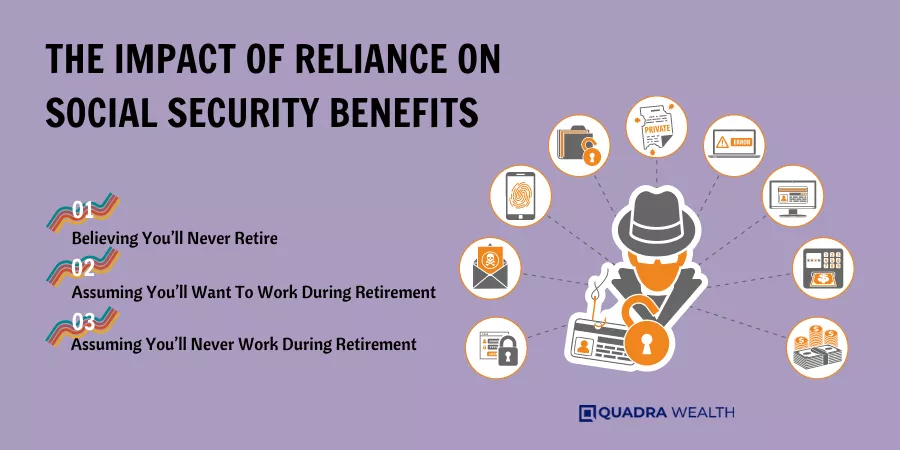Are you worried your retirement planning may be heading toward a cliff? Believe it or not, most GCC expats aren’t prepared for retirement, leaving them vulnerable to financial instability during their golden years.
This blog digs deep into the seven most common mistakes in retirement planning and offers practical solutions. Stick around to discover how you can improve your approach today and secure a bright future tomorrow!
Key takeaways
●Having no retirement plan is a common retirement planning mistake that can leave you financially vulnerable when you least expect it.
●Underestimating the amount of money needed for retirement is another mistake to avoid. Security benefits alone are not enough to cover expenses, so it's important to have a substantial nest egg saved up.
●Failing to increase your savings after a pay increase means missing out on potential growth and compounding interest, which can significantly impact your overall retirement funds.
●Incorrect beneficiary designations, high retirement account fees, and not checking your account's performance regularly are all mistakes that can have negative consequences on your savings for the future.
Common Retirement Planning Mistakes
Many people make common retirement planning mistakes, such as not having a retirement plan, not knowing how much they need to retire, and not increasing their savings after a pay increase.

Having No Retirement Plan
A staggering number of people neglect the necessity of retirement plans. This is an alarming mistake that can lead to exhausting retirement funds prematurely.
Without a proper plan, you’re essentially navigating your future blindfolded with no clue about how much money you’ll need for your silver years.
You might also overlook crucial aspects like medical expenses during retirement, which according to facts, are often left underestimated without adequate planning in place.
Not having concrete retirement plans might leave you financially vulnerable when you can least afford them in your elderly years.
Not Knowing How Much You Need To Retire
Misjudging the amount required for retirement is an easy mistake to make. A common misconception is that Security benefits will cover most of one’s expenses in your full retirement age. Unfortunately, this isn’t true as these benefits represent about only 39% of elderly people’s earnings.
For a comfortable life during your post-career years, you need to have a substantial nest egg saved up.
Many individuals underestimate the funds needed to maintain their lifestyle after they stop working full-time.
To stay on track with your planning for retirement, it’s vital to calculate how much money you’ll need for medical expenses and other costs of living during those golden years.
Legal financial advisers can help create a financial plan tailored to meet individual needs and preferences while considering projected inflation rates and healthcare costs.
Not Increasing the Amount You Save After a Pay Increase
Many people commit a common mistake in planning for retirement by not raising their retirement savings rate after getting a pay increase. This is like leaving money on the table, especially if your employer matches your 401(k) contributions.
Just as you adjust your lifestyle with every salary bump, it’s crucial to also adjust your savings plan.
Failing to boost savings following a raise means missing out on the potential growth of a retirement fund over time.
In fact, even small increments can lead to significant increases in the overall nest egg due to the power of compounding interest. It’s essential for individuals aiming for financial readiness upon retiring that they put any extra income towards their pension plans or IRA accounts instead of just increasing spending habits.
Having Incorrect Beneficiary Designations
Having incorrect beneficiary designations is a common retirement planning mistake. When you designate beneficiaries for your retirement accounts, such as your 401(k) or IRA, it’s important to ensure that the information is accurate and up-to-date.
Incorrect beneficiary designations can lead to unintended consequences and complications for your loved ones upon your passing. For example, if you forget to update your beneficiaries after a divorce or the birth of a child, the wrong people may end up receiving your assets.
It’s crucial to regularly review and update your beneficiary designations to reflect any changes in personal circumstances and ensure that your savings for retirement can go where you intend them to go when you’re no longer around.
Paying High Retirement Account Fees
High retirement account fees can significantly impact your savings over time. According to a study, a typical worker who starts saving at age 25 and pays a 1% investment fee will end up spending nearly $140,000 in fees over their lifetime.
For high-earning individuals making $75,000 at 25 years old, this number jumps to over $340,000 in investment fees. Variable annuities can also be costly with fees and surrender charges that are 50% to 100% higher compared to other mutual fund options.
It’s important to be aware of the fees associated with your retirement account and consider lower-cost alternatives to maximize your savings for the future and to attain financial independence.
Not Checking Your Retirement Account’s Performance
Not checking your retirement account’s performance can be a costly mistake. By neglecting to review how your investments are performing, you may miss out on opportunities for growth and potentially lose fund.
It’s important to regularly assess the performance of your retirement account to ensure that it aligns with your financial goals and objectives. Monitoring your investments allows you to make any necessary adjustments or changes to optimize returns and secure a comfortable retirement.
Don’t underestimate the importance of staying informed about the performance of your retirement account.
It is worth noting that not monitoring your retirement account’s performance could also lead to missed opportunities for growth and potential loss of fund in the long run. A lack of regular assessment means you might not realize if certain investments within your portfolio are underperforming or experiencing significant market risks.
The Impact of Reliance on Social Security Benefits
Believing You’ll Never Retire and assuming You’ll Want To Work During Retirement can have a significant impact on your reliance on Security benefits.

Believing You’ll Never Retire
Many individuals make the mistake of believing they will never retire. However, this mindset can have serious consequences on their future financial stability.
Security benefits only account for about 39% of income for elderly individuals, leaving a significant gap to be filled by personal savings.
It is important to start saving for retirement early and consistently. This allows for compound interest to work in your favor and helps build a substantial nest egg over time.
By acknowledging the reality of retirement and taking proactive steps to save, individuals can secure a comfortable and worry-free future.
Assuming You’ll Want To Work During Retirement
Many people assume that they will want to work during retirement, either because they enjoy their job or because they need extra income. However, it’s important to consider the potential impact on your retirement lifestyle and savings.
Working during retirement can have advantages, such as providing a sense of purpose and social engagement.
On the other hand, it may also limit your ability to fully enjoy your golden years and take advantage of leisure activities.
Additionally, relying on work income during retirement could mean you haven’t saved enough beforehand. It’s crucial to carefully evaluate whether working during retirement aligns with your financial goals and desired lifestyle.
Assuming You’ll Never Work During Retirement
Many people assume that once they retire, they will never work again. However, this assumption can be a big retirement planning mistake.
In reality, a significant number of retirees find themselves in need of additional income to cover their expenses or maintain their desired lifestyle.
According to the Social Security Administration, Security benefits only account for about 39% of elderly people’s income. This means that relying solely on these benefits may not be enough to sustain you throughout your retirement years.
It’s important to consider the possibility of working part-time or pursuing other sources of income during retirement to ensure financial stability and peace of mind.
Additionally, there are several reasons why someone might choose to work during retirement beyond just the financial aspect. Many retirees find great fulfillment in staying active and engaged by continuing to work in some capacity.
It provides them with a sense of purpose and keeps them mentally and socially stimulated. Furthermore, working during retirement can also help individuals stay connected with their professional networks and keep up with industry trends.
The Importance of a Retirement Account Provide Tax Benefits
Having the right individual retirement account with tax planning benefits can make a significant impact on your financial future. Find out how to maximize your savings and take advantage of these important advantages.
Read more to learn about the importance of a retirement account that offers taxable income benefits.

Having Incorrect Transfer-on-Death and Payable-on-Death Designations
Incorrect transfer-on-death and payable-on-death designations can have significant consequences for the distribution of assets in your retirement account. It is crucial to ensure that you have the correct designations associated with your account to ensure that your assets are distributed according to your wishes.
Cashing Out Your Pension
Cashing out your pension before retirement can have serious financial consequences. If you withdraw money from your pension early, you may face hefty tax penalties and a 10% early withdrawal penalty.
This means that a significant portion of your hard-earned savings will go to pay taxes instead of growing for your retirement years. It’s important to resist the temptation to cash out your pension and instead leave it untouched until you retire so that it can continue to grow and provide you with the retirement income you need during your golden years.
Buying Too Much Company Stock
Buying too much company stock can be a potential retirement planning mistake. While it’s understandable to want to invest in the company you work for, relying heavily on one stock can be risky.
If something were to happen to the company and its stock value declines significantly, it could negatively impact your savings.
It is recommended to choose investments that can keep up with inflation, such as a stock mutual fund or real estate securities.
Diversifying your portfolio by investing in different assets can help protect your retirement savings and potentially provide more stable returns over time.
Not Picking the Right Investments
Choosing the right investments for retirement is crucial. The wrong investment decisions can have significant consequences on your savings.
It’s important to consider factors such as risk tolerance, time horizon, and investment goals when selecting where to put your money.
Additionally, high fees can eat up a substantial portion of your savings over time, so it’s essential to choose investments with low fees and expenses.
Variable annuities may seem tempting, but they tend to be more expensive than other mutual fund options. Remember that the rate of return and starting age can greatly impact the amount saved for retirement.
By carefully selecting the right investments and considering these factors, you can set yourself up for a secure financial future in retirement.
Burning Through Your Retirement Savings
Many retirees make the mistake of burning through their savings too quickly. This can happen due to a lack of budgeting or underestimating how long their retirement years will last.
It’s important to remember that your retirement savings need to last for possibly three decades or more, so it’s crucial to develop a sustainable withdrawal strategy. In addition, unexpected medical expenses can wreak havoc on your finances if you haven’t planned accordingly.
To avoid this common mistake, create a realistic and conservative budget that takes into account all potential expenses throughout your retirement years.
Furthermore, it is essential to understand the impact of inflation and rising healthcare costs on your savings. Over time, the cost of living will increase, making it necessary to have enough retirement funds set aside for these future expenses.
Misconceptions About Retirement
Many people have misconceptions about retirement that can hinder their financial security. Don’t fall into these traps – read on to learn more.

Retiring Too Early
Retiring too early can have significant financial implications. When individuals retire before their full retirement age, they may face a reduced Social Security payout. Monthly benefits can be reduced by around 30% if you start receiving benefits at age 62 instead of your full retirement age.
This reduction in income can make it difficult to maintain the desired lifestyle during retirement and may lead to increased reliance on Social Security benefits alone.
Additionally, retiring early without proper financial planning can result in higher healthcare expenses. Fidelity Investments estimated that a couple retiring in 2017 should expect to spend approximately $275,000 on medical expenses throughout retirement.
These costs can quickly deplete savings and put a strain on one’s financial security.
Investing Too Conservatively
Investing too conservatively can be a mistake when planning for retirement. While it’s natural to want to protect your savings, shying away from the stock market completely may hinder your ability to grow your wealth.
Historically, stocks have returned an average of about 10% a year, which can help offset inflation and ensure that your savings keep up with rising costs over time.
However, many people find the stock market intimidating or scary, with 61% of adults feeling this way.
It’s important to choose investments that have the potential to keep pace with inflation and provide you with enough retirement income.
By investing too conservatively, you may miss out on opportunities for growth and end up with misconceptions about what retirement will actually look like in terms of financial stability.
Investing Too Aggressively
Investing too aggressively can be a common retirement planning mistake. It may seem enticing to chase high returns and take on risky investments, but this approach can lead to significant losses.
It’s important to remember that as you near retirement, preserving your savings becomes more crucial than trying to earn huge gains. By taking on too much risks, you could potentially jeopardize your nest egg.
Instead, consider diversifying your investments and opting for a more balanced approach that aligns with your long-term goals.
Putting Your Money in Variable Annuities
Variable annuities can be an option for retirement savings, but it’s important to understand the potential drawbacks. These annuities often come with higher fees and surrender charges compared to other mutual fund options, sometimes costing up to 100% more.
Additionally, the gains on variable annuities are taxed as normal income when you withdraw them. On the positive side, variable annuities offer regular payments throughout your lifetime and include a death benefit.
It’s crucial to carefully consider the costs and benefits before putting your money in variable annuities.
The Late Retirement Planning Dilemma
Starting your retirement planning too late can have serious consequences on your financial future.

Starting Your Retirement Planning Too Late
Starting your retirement planning too late can have significant consequences on your financial well-being. If you delay saving for retirement, it will require much larger monthly contributions to catch up on lost time.
For example, if you start at the age of 50 and plan to retire at 65, you would need to set aside over $1,400 each month to match the savings of someone who started at 40. Carrying debt into retirement is also detrimental as it eats away at your savings.
It’s recommended to pay off all debt before retiring if possible. However, even if you’re starting late, it’s still worth making an effort to save for retirement and catch up as much as possible.
Saving Too Much, Too Early
Saving too much, too early in your retirement planning may seem like a good idea, but it can have some drawbacks.
While it’s important to start saving as soon as possible, putting away too much money, in the beginning, can leave you cash-strapped in the present.
Additionally, if you save excessively early on, you may miss out on enjoying your younger years and pursuing opportunities that require some financial flexibility.
It’s all about finding a balance between saving for the future and living comfortably in the present.
Avoiding Stocks
Many people make the mistake of avoiding stocks when it comes to planning for retirement. However, this can be a missed opportunity for growth and potentially higher returns on investment.
While stocks do come with some level of risk, they also have the potential for greater rewards compared to other investment options.
It’s important to diversify your retirement portfolio and include a mix of stocks along with other types of investments such as bonds or real estate.
By doing so, you can potentially increase your chances of achieving your retirement goals and building a more secure financial future. So don’t shy away from considering stocks as part of your retirement planning strategy.
Not Planning for Medical Expenses
Planning for retirement is about more than just saving for a comfortable lifestyle. It’s also crucial to consider medical expenses that may arise during retirement.
According to Fidelity Investments, a couple retiring in 2022 should expect to spend approximately $315,000 on medical costs throughout their retirement.
These expenses are predicted to increase annually, making it even more important to plan ahead. Not factoring in these healthcare expenses can have a significant impact on your savings and financial security.
So, it’s essential to include them in your retirement plan and explore options such as long-term care insurance or Medicare coverage to ensure you’re prepared for the potential costs of medical care in your golden years.
Not Calculating How Long Your Retirement Will Be
Calculating the length of your retirement is a crucial step in planning for retirement. By not taking this into account, you could risk running out of funds too soon or being unprepared for an extended retirement period.
It’s essential to consider factors such as life expectancy, health conditions, and family history when estimating how long your retirement will be. This way, you can make informed decisions about saving rates and an investment strategy to ensure that your finances last throughout your retirement years.
Unrealistic Expectations for Retirement
Many individuals make the mistake of prioritizing their child’s education over saving for retirement, neglecting the importance of securing their own financial future.

Paying Off Debt Before Saving For Retirement
Paying off debt before saving for retirement is a crucial step in securing your financial future. By prioritizing debt repayment, you can free up more money to save and invest for retirement.
High-interest debts, such as credit card balances or personal loans, can eat away at your savings potential if left unchecked.
By tackling these debts early on, you can avoid paying unnecessary interest fees and make significant progress toward building a nest egg for retirement.
Remember, every dollar saved now has the potential to grow over time through compounding interest, making it even more important to prioritize debt repayment before starting to save for retirement.
Prioritizing Your Child’s Education Over Retirement
Prioritizing your child’s education over retirement is a common mistake that many parents make. While it’s important to invest in your child’s future, it shouldn’t come at the expense of your own financial security in retirement.
Remember, there are other options available for funding your child’s education such as scholarships, grants, and student loans. By prioritizing saving for retirement, you can ensure that you have enough money to support yourself during your golden years and avoid becoming a burden on your children.
So instead of sacrificing your savings for education expenses, consider exploring alternative methods of financing your child’s education while still putting away money for your own future.
Carrying Debt Into Retirement
Carrying debt into retirement can have a significant impact on your financial well-being. Not only does it create added stress, but it also eats away at your savings. It is crucial to pay off all debts before retiring to ensure that you have the financial stability and freedom to enjoy your golden years.
By eliminating debt, you can allocate more of your income towards living expenses, travel, and other activities that bring you joy in retirement.
So make it a priority to become debt-free before entering this new phase of life.
Forgetting About Inflation During Retirement
Many retirees make the mistake of forgetting to factor in inflation when planning for their retirement. Inflation can have a significant impact on the purchasing power of savings over time.
It is important to consider that the cost of goods and services tends to increase annually, which means that the same amount of money will buy less in the future.
Failing to account for inflation can leave retirees with
less money than they anticipated, potentially causing financial strain during their retirement years.
To ensure a comfortable and secure retirement, it is crucial to take into account how inflation will affect expenses and adjust savings accordingly.
Giving Up Hope Because You Started Late
Waiting until later in life to start saving for retirement can be discouraging, but it’s important not to give up hope. While starting late may require more aggressive savings and catch-up contributions, it is still possible to build a comfortable nest egg for retirement.
In fact, making extra contributions or increasing your monthly savings can help make up for lost time. Remember that even small amounts saved consistently over time can add up significantly due to compound interest.
By staying committed and making smart financial decisions, you can still achieve a secure and enjoyable retirement, regardless of when you started planning.
Conclusion
In conclusion, it’s never too late to improve your retirement planning. By avoiding common retirement mistakes such as not having a plan, neglecting beneficiary designations, and underestimating expenses, you can set yourself up for a more secure future.
Take the time today to assess your retirement goals and make adjustments where needed. Remember, even small improvements can have a significant impact on your financial well-being in retirement.
Start taking action now to ensure that your biggest retirement planning mistakes pass the test.
FAQs
The retirement mistake to avoid include not starting early enough, underestimating expenses, relying too heavily on Social Security, failing to diversify investments, and not having a comprehensive plan in place.
You can determine if your retirement plan is effective by regularly reviewing and assessing your financial goals, monitoring your savings and investment progress, adjusting your plan as needed based on changes in income or expenses, and seeking professional advice when necessary.
To improve your retirement planning today, you can start by setting specific financial goals, creating a budget to control spending and save more money, maximizing contributions to retirement accounts such as 401(k), traditional IRA or roth IRA, diversifying investments for potential growth while managing risks, and educating yourself about different retirement strategies.
While it is ideal to start planning for retirement as early as possible, it is never too late to begin taking steps toward securing your future. Even if you are nearing retirement age or have minimal savings set aside, consulting with a trusted financial advisor and tax advisor can help create a tailored plan that maximizes the available resources and sets you on a path toward financial stability during your golden years.

Should I talk to a Financial Advisor When Buying a House?
In This Article Should I talk to a Financial Advisor When Buying a House? Or

Master Robert Kiyosaki 10 Keys to Financial Freedom
In This Article Robert Kiyosaki 10 keys to financial freedom Have you ever felt the

Can SIPs Make You Rich? Mutual Fund SIP Grow Your Wealth
In This Article Can SIP make you rich? Systematic Investment Plans can help in wealth

Exclusive Investments of Elon Musk: Disruption, Vision, and Risk
In This Article A visionary entrepreneur who has been a consistent disruptor in the way







